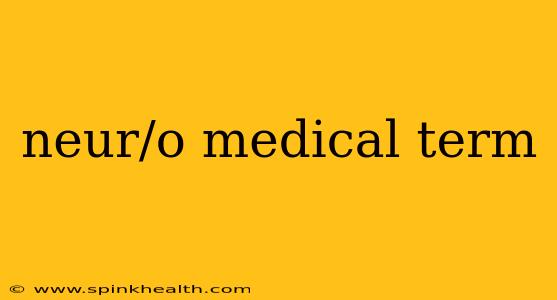Decoding "Neuro": A Journey into the Nervous System
The term "neuro" is a prefix derived from the Greek word "neuron," meaning "nerve." It's a cornerstone in medical terminology, signaling a connection to the nervous system – the intricate network responsible for controlling everything from our thoughts and movements to our breathing and heartbeat. Understanding "neuro" unlocks a deeper appreciation of the complex processes governing our bodies and minds.
This isn't just about medical jargon; it's about understanding the incredible system that makes us who we are. Imagine a vast, interconnected web of billions of cells, constantly communicating, reacting, and adapting. That's the nervous system, and the prefix "neuro" is our key to understanding its many facets.
Let's delve into some common uses of "neuro" in medical terms and explore some frequently asked questions.
What are some common medical terms starting with "neuro"?
Many medical terms incorporate "neuro," each specifying a different aspect of the nervous system. Some common examples include:
- Neurology: This is the branch of medicine focused on the diagnosis and treatment of disorders affecting the brain, spinal cord, and nerves. Neurologists are medical doctors specializing in these conditions.
- Neurosurgery: This surgical specialty deals with the brain, spinal cord, and peripheral nerves. Neurosurgeons perform intricate operations to address a wide range of neurological issues.
- Neurological examination: This is a comprehensive assessment conducted by neurologists to evaluate the function of the nervous system. It involves observing reflexes, motor skills, cognitive abilities, and sensory functions.
- Neurotransmitter: These are chemical messengers that transmit signals across synapses (connections) between nerve cells. Examples include dopamine, serotonin, and acetylcholine. Imbalances in neurotransmitters are linked to several neurological and psychiatric conditions.
- Neuropathic pain: This type of pain arises from damage or dysfunction in the nervous system. It can be chronic and intensely debilitating.
- Neurodegenerative diseases: This category encompasses diseases characterized by the progressive loss of structure or function of neurons. Alzheimer's disease and Parkinson's disease are prime examples.
What does "neuro" mean in different contexts?
The versatility of "neuro" extends beyond strict medical definitions. You might encounter it in phrases like "neurodiversity," referring to the range of differences in neurological conditions. This emphasizes the inherent variation in human brain function and challenges stigmatizing perceptions of neurological differences. The term is frequently used in discussions about autism, ADHD, and other conditions.
Similarly, "neuro-linguistic programming (NLP)" is a communication technique that aims to improve personal development by altering thought patterns and behaviors.
How is "neuro" used in research?
"Neuro" features prominently in scientific research encompassing various disciplines, including neuroscience, neurobiology, and neuropharmacology. Researchers use it to describe studies focusing on the nervous system's structure, function, and diseases. This research is crucial for developing new treatments and therapies for neurological disorders.
What are some neurological disorders?
Numerous conditions affect the nervous system. Some notable examples include:
- Stroke: This occurs when blood supply to part of the brain is interrupted, causing brain cell damage.
- Multiple sclerosis (MS): An autoimmune disease affecting the brain and spinal cord, leading to inflammation and nerve damage.
- Epilepsy: A neurological disorder characterized by recurrent seizures.
- Alzheimer's disease: A progressive neurodegenerative disease causing memory loss and cognitive decline.
- Parkinson's disease: A neurodegenerative disease impacting movement and coordination.
Understanding the prefix "neuro" opens a window into the fascinating and intricate world of the nervous system. From medical diagnoses to research breakthroughs, this simple prefix encapsulates a universe of knowledge about the very essence of how we think, feel, and move. As research continues to advance, the understanding and treatment of "neuro" related conditions will undoubtedly improve, offering hope and better quality of life for millions.

